
JOURNAL OF PHILOSOPHICAL LOGIC
Scope & Guideline
Exploring the Depths of Logic and Philosophy
Introduction
Aims and Scopes
- Formal Logic and Its Philosophical Implications:
The journal focuses on the development and analysis of formal logic systems, investigating their philosophical implications and applications in understanding reasoning, inference, and truth. - Modal and Intuitionistic Logics:
There is a strong emphasis on modal logics, intuitionistic logics, and related systems, including their axiomatizations and the exploration of their semantics and applications in various philosophical contexts. - Counterfactual and Conditional Logics:
The journal frequently publishes works on counterfactual reasoning and conditional logics, examining their formal properties and implications for epistemology and metaphysics. - Epistemic and Doxastic Logics:
Research on epistemic logics, which deal with knowledge and belief, is prevalent, reflecting the journal's commitment to exploring the logical structures underlying epistemic modalities. - Paraconsistent and Non-classical Logics:
There is a notable focus on paraconsistent logics and other non-classical frameworks, investigating how these logics handle contradictions and their relevance to philosophical debates.
Trending and Emerging
- Dynamic and Contextual Logics:
There is a rising trend in the exploration of dynamic logics that account for context and change, reflecting an increasing interest in how logic interacts with real-world scenarios and communicative practices. - Higher-Order and Hyperintensional Logics:
Emerging research on higher-order logics and hyperintensionality is becoming more prominent, indicating a shift towards addressing complex philosophical issues surrounding meaning, reference, and modality. - Interventionist and Causal Reasoning:
The journal has seen an increase in studies focusing on interventionist approaches to counterfactuals and causal reasoning, highlighting the relevance of these concepts in contemporary philosophical debates. - Computational and Algorithmic Approaches:
There is a growing interest in the application of computational methods and algorithmic approaches to logical problems, reflecting an interdisciplinary trend that bridges philosophy, computer science, and formal logic. - Complexity and Non-monotonic Reasoning:
Recent publications have begun to emphasize complexity within logical systems and non-monotonic reasoning, addressing how these concepts can inform philosophical discussions on rationality and belief.
Declining or Waning
- Classical Logic and Its Foundations:
There has been a noticeable decrease in publications centered around classical logic and its foundational aspects, suggesting a possible shift towards more innovative and less traditional logical systems. - Traditional Set Theory:
The exploration of classical set theory and its philosophical implications appears to be waning, with fewer papers addressing its foundational challenges in comparison to more contemporary approaches. - Basic Propositional Logics:
Interest in basic propositional logics seems to be declining, as the journal increasingly favors more complex and nuanced logical systems that address contemporary philosophical problems.
Similar Journals
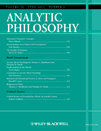
Analytic Philosophy
Connecting Scholars to the Heart of Analytic PhilosophyAnalytic Philosophy is a prestigious journal published by Wiley, dedicated to advancing critical discourse in the realm of philosophy. With an ISSN of 2153-9596 and an E-ISSN of 2153-960X, this journal has rapidly established itself as a vital resource for researchers, professionals, and students seeking to explore contemporary philosophical debates and analytic methods. Operating from the heart of the United States, located at 111 River St, Hoboken, NJ, it holds an impressive Q1 classification in the field of philosophy for 2023, ranking #190 out of 806 within Scopus's Arts and Humanities category, placing it in the top 76th percentile. The journal’s commitment to rigor and innovation makes it an essential platform for thought-provoking research and discussions in analytic philosophy. Researchers will appreciate the journal’s high standards and its significant impact within the academic community.

JOURNAL OF LOGIC AND COMPUTATION
Unraveling Complexities in Logic and ComputationJOURNAL OF LOGIC AND COMPUTATION, published by Oxford University Press, is a leading peer-reviewed journal dedicated to advancing research in the intersections of logic, computation, and theoretical frameworks of computer science. With an ISSN of 0955-792X and an E-ISSN of 1465-363X, the journal has established itself within academic circles, boasting significant impact evidenced by its category quartiles, including a Q1 ranking in Arts and Humanities (miscellaneous) and a Q2 in Logic for 2023. This prestigious journal emphasizes interdisciplinary approaches to understanding computational systems, hence targeting a diverse audience of researchers, professionals, and students keen on exploring provocative questions in logic and computation. Although not open access, the content is highly valuable, reflecting contemporary challenges and advancements in the field. With over three decades of published work, spanning from 1990 to 2024, the journal continues to contribute richly to the discourse surrounding logical methodologies and computational innovations, making it an essential resource for those engaged in these dynamic areas of study.
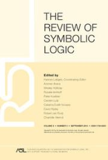
Review of Symbolic Logic
Unraveling the Complexities of Mathematical LogicReview of Symbolic Logic is a prestigious academic journal published by Cambridge University Press, dedicated to advancing the field of logic through critical analysis and innovative research. Established in 2008, the journal has become a key fixture in the academic community, particularly recognized for its contributions in the realms of logic, mathematics (miscellaneous), and philosophy. With an impressive classification of Q1 across multiple categories in 2023, it ranks within the top echelons of its field, standing at 15th out of 41 in Logic and 29th out of 90 in miscellaneous mathematics, positioning itself as essential reading for scholars and practitioners alike. Although not Open Access, the journal offers robust access options through institutional subscriptions, providing an expansive platform for the dissemination of high-quality research. Review of Symbolic Logic aims to foster a deeper understanding of symbolic logic's applications and implications while inspiring emerging scholars and seasoned researchers to further the dialogue within this vibrant area of study.
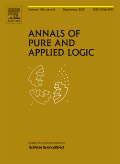
ANNALS OF PURE AND APPLIED LOGIC
Pioneering Insights in Mathematical LogicANNALS OF PURE AND APPLIED LOGIC is a premier academic journal published by Elsevier, specializing in the foundational aspects of logic since its inception in 1974. With a strong commitment to disseminating original research, the journal focuses on both pure and applied logic, making significant contributions to the fields of mathematics and computer science. The journal is recognized for its rigorous peer-review process and is currently ranked Q1 in Logic, reflecting its status among the top-tier publications in the discipline. Researchers will find valuable insights and advancements in logical theory and practice in its pages, while the journal's Scopus ranking further positions it strategically within the mathematical logic community. Although it is not an open-access publication, it offers convenient access options for institutions and subscribers, ensuring a wide reach for groundbreaking findings. The ANNALS OF PURE AND APPLIED LOGIC continues to be an essential resource for professionals, students, and academics alike, facilitating a deeper understanding of logical frameworks and their applications.

Australasian Journal of Logic
Connecting disciplines through the lens of logic.The Australasian Journal of Logic is a prominent scholarly publication in the field of logic, published by the Australasian Association for Logic. With an ISSN of 1448-5052, this journal serves as a vital platform for disseminating research that advances the understanding and application of logical theory and its intersection with various disciplines. Although it is not open access, its rigorously peer-reviewed articles cater to academics, researchers, and students keen on exploring contemporary issues in logic both in theoretical and practical domains. The journal aims to foster scholarly communication and collaboration within the logic community, encouraging the exchange of ideas and insights that shape the future of logical studies. By contributing to the growing body of knowledge in this essential field, the Australasian Journal of Logic plays a crucial role in enhancing the intellectual landscape of logic research.
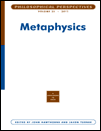
Philosophical Perspectives
Innovating the landscape of philosophical dialogue.Philosophical Perspectives is a premier academic journal published by WILEY, dedicated to advancing the field of philosophy through innovative and rigorous research. Established more than two decades ago, this esteemed UK-based journal carries the ISSN 1520-8583 and E-ISSN 1758-2245, and it has earned a reputation for quality, as reflected in its ranking in the top quartile (Q1) for philosophy. With an impressive Scopus rank of #152 out of 806 and a respectable 81st percentile standing, it is a significant platform for scholars seeking to disseminate their findings and contribute to philosophical discourse. The journal's objectives include fostering critical thought and interdisciplinary dialogue, making it an essential resource for researchers, professionals, and students alike. Although it does not currently offer open access options, its content is meticulously curated to ensure relevance and depth, covering a wide array of philosophical topics from ethics to metaphysics. As a vital part of the philosophical community, Philosophical Perspectives continues to shape the future of philosophical inquiry and practice.

Logic and Logical Philosophy
Unraveling the Threads of ReasonLogic and Logical Philosophy is a distinguished journal published by Nicolaus Copernicus University Torun, Poland. With its ISSN 1425-3305 and E-ISSN 2300-9802, the journal has established itself as a premier outlet for cutting-edge research in the field of philosophy, specifically focusing on the intricate intersections of logic and philosophical inquiry. Since its inception, the journal has consistently demonstrated its impact within the academic community, achieving a commendable Q1 ranking in the 2023 Arts and Humanities category, placing it in the 73rd percentile of publications in the field. The journal aims to foster scholarly dialogue and contribute significantly to the advancement of philosophical understanding through rigorous research articles, critical reviews, and discussions. With a commitment to high academic standards and accessibility—though specific access options may vary—Logic and Logical Philosophy remains an essential resource for researchers, professionals, and students alike, paving the way for innovative philosophical discourse until 2024 and beyond.
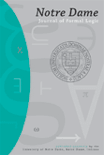
Notre Dame Journal of Formal Logic
Elevating Scholarly Discourse in Formal LogicNotre Dame Journal of Formal Logic is a premier academic publication dedicated to the advancement of research in the field of logical studies. Published by DUKE UNIVERSITY PRESS, this journal has been a significant contributor to the discipline since its inception in 1960, with an impressive convergence of scholarly articles expected to continue through 2024. With its focus on rigorous formal logic, the journal plays a crucial role in fostering discussions that bridge mathematics and philosophical inquiry, holding a notable Q2 ranking in the 2023 Logic category. Despite its non-open-access status, the journal reaches a wide audience of researchers, professionals, and students committed to exploring the foundational aspects of logics. Located in Durham, NC, it provides a platform for innovative thought and critical engagement within the logic community. With its impactful contributions, the Notre Dame Journal of Formal Logic stands as a vital resource for those seeking to deepen their understanding of both classic and contemporary logical theories.

Logica Universalis
Exploring the Intersection of Theory and ApplicationLogica Universalis is an esteemed academic journal published by SPRINGER BASEL AG, dedicated to advancing the fields of Applied Mathematics and Logic. With its ISSN 1661-8297 and E-ISSN 1661-8300, the journal has been active from 2007 and continues to contribute significantly to the discourse surrounding mathematical logic and its applications up to 2024. Located in Basel, Switzerland, Logica Universalis holds a notable position within the academic community, evidenced by its ranking within the Q4 category of both Applied Mathematics and Logic as of 2023. While it currently operates without Open Access options, the journal remains a pivotal resource for researchers and practitioners seeking to explore foundational and applied aspects of logic. Moreover, with a Scopus rank of #22/41 in Logic and #464/635 in Applied Mathematics, it provides a platform for comprehensive knowledge dissemination and facilitates innovative research that bridges theoretical and practical methodologies. This journal is instrumental for anyone looking to deepen their understanding and make meaningful contributions to these intertwined domains.

RUSSELL-THE JOURNAL OF THE BERTRAND RUSSELL STUDIES
Engaging with the Timeless Ideas of Bertrand RussellRUSSELL - THE JOURNAL OF THE BERTRAND RUSSELL STUDIES, published by Johns Hopkins University Press, is a prominent scholarly platform dedicated to the exploration and analysis of the philosophical contributions of Bertrand Russell. With an ISSN of 0036-0163 and E-ISSN 1913-8032, this journal serves as an essential resource for researchers and students in the field of philosophy, particularly those interested in modern philosophical thought and Russell's lasting impact. Although it operates under a traditional subscription model, it remains a crucial publication within its quadrant, ranking in the 21st percentile among its peers and classified in the Q4 quartile for 2023 in the Philosophy category. Covering a time frame from 2002 to 2024, the journal showcases a wealth of contemporary literature, critical essays, and discussions that propel the conversation around Russell's theories and their implications in today's philosophical inquiries. As an established journal in Canada, it presents a unique opportunity for academics and enthusiasts alike to engage with Russell's work and its relevance to both historical and contemporary debates in philosophy.